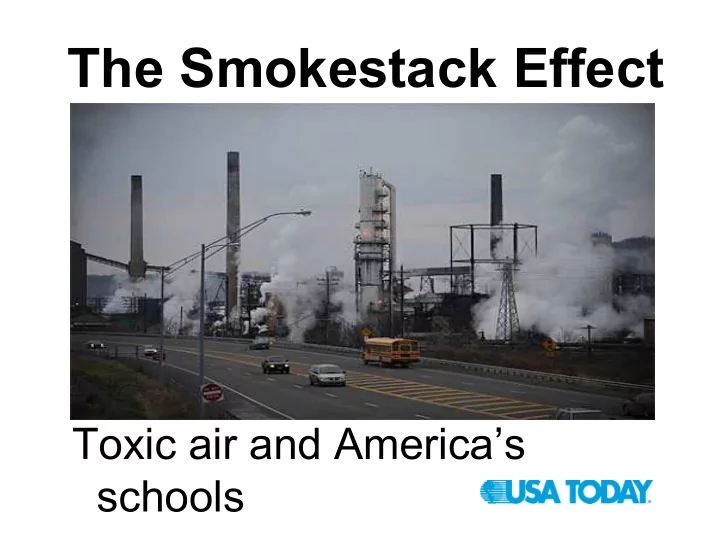

The Smokestack Effect Toxic air and America’s schools
THE DANGERS Children uniquely vulnerable to toxic chemicals EPA had never used its data this way No laws compel monitoring for scores of most dangerous chemicals
OUR APPROACH STEP ONE: Use the best government data to identify toxic hot spots around schools Despite having the tools, the information and an office for children’s health protection, the EPA had never undertaken, let alone considered, such an effort
THE FOUNDATION Partnered with researchers at University of Massachusetts Amherst Collected, overlaid locations of every school in nation Created a database to serve as screening tool – for us and for our readers
VIDEO, PART 1 • By Garrett Hubbard and Steve Elfers
ONLINE DATABASE Enables users to Aerial photo of Natrona Heights, Pa. identify potential problems, sources Shows possible dangers from chemicals Database representation of Natrona Heights, Pa. Contains contact information for schools, industries Q&A offers guidance
THE NEXT STEP Partnered with Johns Hopkins’ Bloomberg School of Public Health, University of Maryland’s School of Public Health Developed monitoring protocol Sent staffers to 95 schools in 30 states
VIDEO, PART 2 By Garrett Hubbard and Steve Elfers
THE RESPONSE Boxer presses new EPA administrator for national action Parents push for school siting rules EPA launches $2.25 million program to monitor near schools EPA replaces head of children’s health
THE CHALLENGES Communities questioning authorities Parents pushing for information EPA vowing to renew agency’s commitment to science, children
OUR RESPONSIBILITIES Explore the database; learn about the chemicals that might be outside your schools Ask questions of regulators, schools, industries Demand complete answers, accountability Don’t assume that laws protect you
Recommend
More recommend